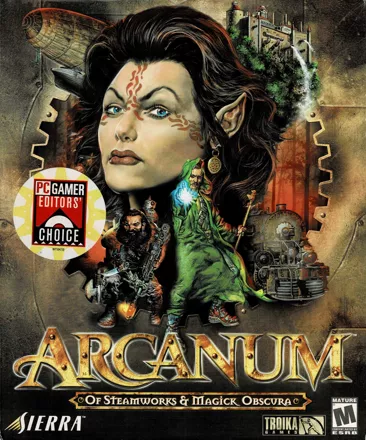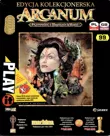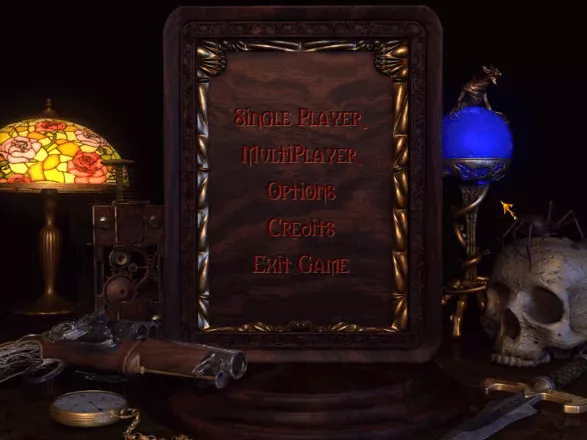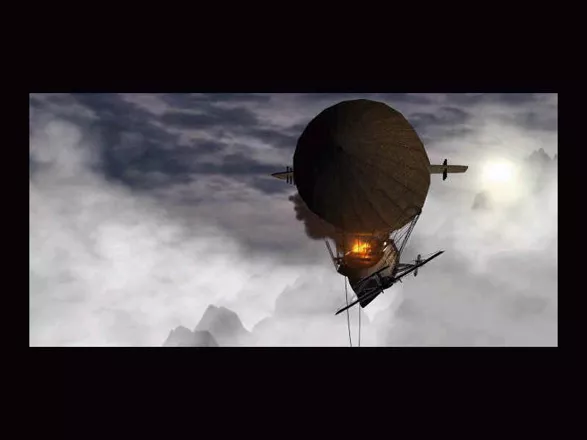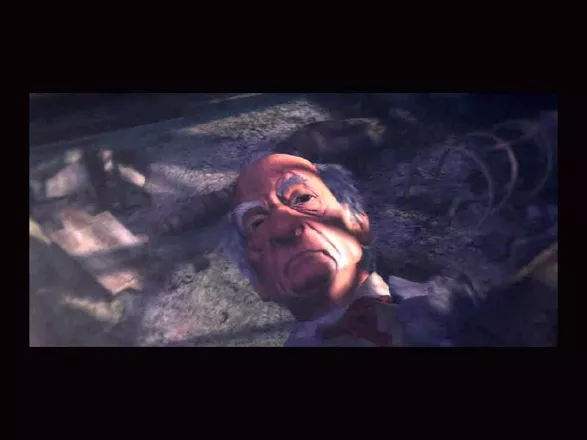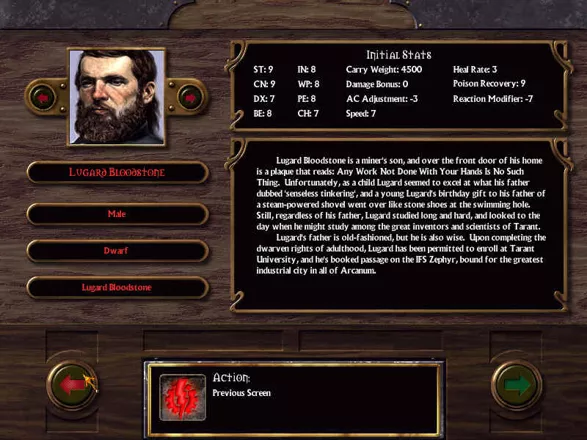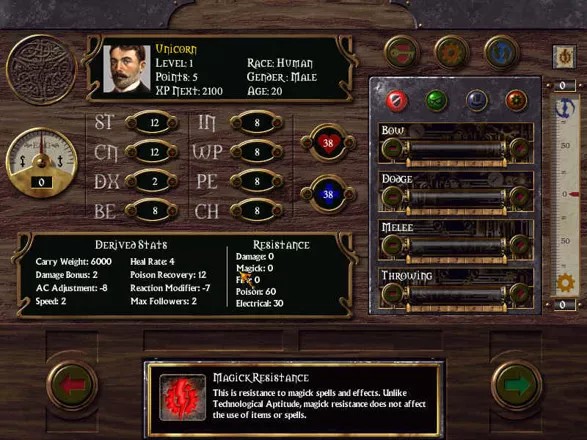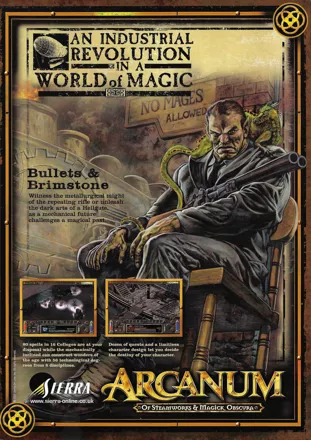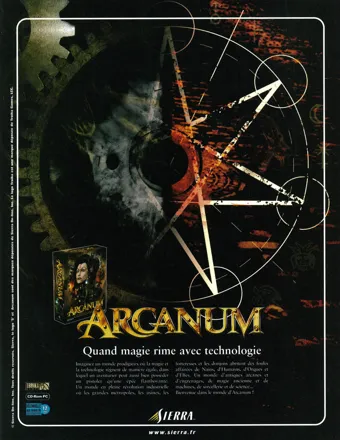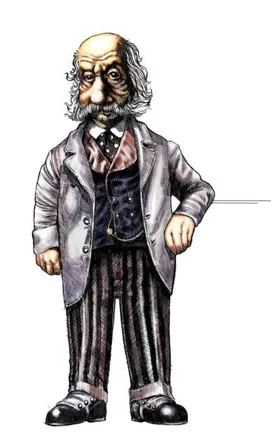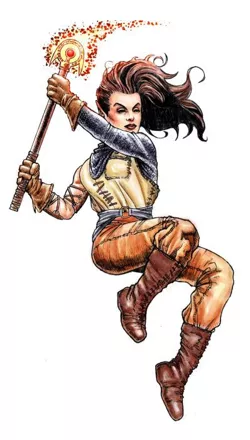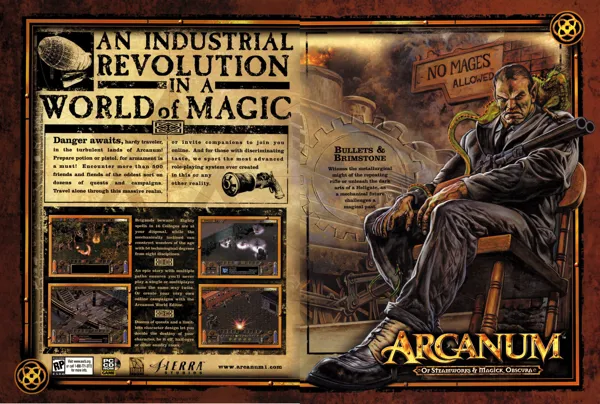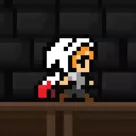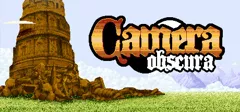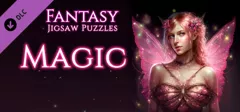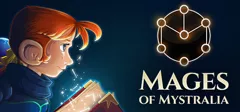Arcanum: Of Steamworks & Magick Obscura
Description official descriptions
The luxury zeppelin IFS Zephyr begins her maiden voyage from Caladon in the Kingdom of Arland to Tarant, one of the largest cities in the technologically advanced Unified Kingdom. Suddenly, while the zeppelin is cruising over mountains, two monoplanes attack it and eventually shoot it down. The two half-ogre attackers die in flames along with all their victims except two who miraculously survived. However, one of them, an old gnome, is mortally wounded. Just before he dies, he gives a silver ring to the other survivor and tells him to "find the boy". The witness of the crash, a man named Virgil, declares that the now only survivor is "The Living One", a reincarnation of a deity, and offers to follow him wherever he goes. The hero begins a long and perilous search for the mysterious boy, the origins of the silver ring, and the unknown enemy who was behind the attack on the zeppelin.
Arcanum is a role-playing game similar in concept and many gameplay principles to Fallout. It is set in a unique world, which can be described as mixture between Tolkienesque fantasy, steampunk technology and elements of British and North American culture of the 19th century: dwarves may carry molotov cocktails, and a half-orc protagonist can travel by train between Victorian-like cities. Magic and technology are opposed to each other; most humans and dwarves embrace technology, while some elf clans stick to the old ways and consider scientific progress evil.
In the beginning of the game the player creates the main character, choosing from a variety of races, attributes, magical or technological disciplines, social skills, backgrounds, etc. When the character levels up, the player can increase his main parameters as well as any available skills. Like in Fallout games, the player directly controls only one character; however, companions who join the party may be given orders, and their inventory can be managed by the player.
The game is open-ended: the player is free to explore the vast world from the onset, undertaking a large amount of side quests or following the main story. Social interaction plays a significant role: depending on the player character's charisma and intelligence attributes, as well as persuasion skill, many problems can be solved in a non-violent way. The amount of companions willing to follow the protagonist also depends on the latter's charisma rating; companions may also leave the party if they disagree with the hero's behavior.
The player can select one of the three combat modes for the game: real-time, turn-based, and fast-paced turn-based. Turn-based mode is similar to the combat in Fallout games: characters require action points to move, attack, or cast spells.
The game includes an editor called WorldEdit, which allows players to create their own maps, campaigns, and non-playable characters. Objects from the base game can be carried across to the player-created scenario. The scenery editor allows players to create their own objects. It is also possible to set and change game variables, i.e. the amount of skill points required to perform a specific task.
Spellings
- 奥秘:技术与魔法 - Chinese spelling (simplified)
Groups +
- BestSeller Series (Cendant / Havas / Vivendi Universal) releases
- Fantasy creatures: Dwarves
- Fantasy creatures: Elves
- Fantasy creatures: Gnomes
- Fantasy creatures: Halflings / Hobbits
- Fantasy creatures: Orcs
- Gameplay feature: Alchemy
- Gameplay feature: Brothels
- Gameplay feature: Character development - Skill distribution
- Gameplay feature: Gambling
- Gameplay feature: Karma meter
- Gameplay feature: Multiple endings
- Middleware: Bink Video
- Physical Bonus Content: World Map
- Protagonist: Female (option)
- Sound engine: AIL/Miles Sound System
Screenshots
Promos
Videos
Add Trailer or Gameplay Video +1 point
See any errors or missing info for this game?
You can submit a correction, contribute trivia, add to a game group, add a related site or alternate title.
Credits (Windows version)
157 People (118 developers, 39 thanks) · View all
| Project Leader | |
| Lead Programming | |
| Programming | |
| Design | |
| Animation | |
| [ full credits ] | |
Reviews
Critics
Average score: 79% (based on 61 ratings)
Players
Average score: 4.0 out of 5 (based on 168 ratings with 13 reviews)
The Good
Arcanum was the first game made by the now dead company Troika. You know, the company founded by the famous trio behind Fallout.
What I liked about Troika, was that their games had this we-made-this-game-for-the-sake-of-just-making-this-game feeling to them. They weren't shiny, polished, 2 and half choice, above average storyline, romance novel characters games.
They were more gamey, flawed, humbler, yet more ambitious in some sense than Bioware's games for example.
Arcanum follows the Fallout school of game design. That means you can almost play any character you want. For example: a handsome "I'll talk my way out of this situation" human male or a dumb half-ogre with a kind heart who sprouts lines like "Flowers!!! They be pretty....ooh, butterfly!", or even a sexy half-orc female mage, who sold her soul to evil and delights in destruction and letting herself be abused my males and then kill them.
Sidenote: there are few scenes when you are a female character and when you want either to survive or get into some club you have to kiss someone's feet or have sex with him.
Aside from the larping stuff (the stuff that only happens in your head, and we don't judge the quality of games on that) the game really allows you to play in anyway you want.
But now to the most important detail. Choices and consequences. You can make choices in this game. I like choices. It respects the player. It makes me respect the game. Respect, Game.
tiny electronical voice: ...respect man....
Bob the Imaginary Gaming Friend: "Nice to see you holding your grasp on reality so well."
Well I think it's great when the game allows you to make choices, and also provide you with shitty consequences rather than hold your hand always and lead you safely through itself. Also shitty consequences is not the same thing as an unfinishable state. They just spice "choices and consequences" with certain element of realism and danger.
I actually would like to tell a little story that I just now remembered. It happened five years ago, in my first playthrough.
You see, somewhere in storyline you need to sail onto some distant island, and when you do get that far you need to get a ship to sail. And how do you get a ship? Well you could buy it for a very large amount of cash somewhere in tens of thousands (I only had like 500) or you could get one from an undead pirate called Pete.
Bob: "Now that's a brilliant name for an undead pirate."
Anyway there are three ways to get the ship from Pete, gamble for it (unfortunately I didn't find gambling skills important early in the game so I had not invested any points into it), kill Pete for the ship, which I tried but couldn't beat him since my character was built as a diplomatic character...
Bob: "Diplomatic character who doesn't have any gambling skills? Isn't that like an oxymoron?"
... or do three quests for Pete. Well what happened was that I screwed up one of his quests, I don`t remember how, but I do remember the fear that I was not going to finish the game and that all this was for nothing. So there I was, doing sadly some quests for some gnomish politician in hopes of earning some cash, when another gnomish guy comes to talk with me. He offered me a job as an assassin and the amount of cash was just what I needed. I remember this because I had serious moral issues with this quest, you see back then I played myself in RPG's, or at least an ideal of myself - a weak in body, charismatic, very handsome, unbelievably sexy and intelligent male with a kind heart.
Bob: "Oh God! That just screams white and nerdy to me."
He wanted me to kill the King of Caladon, it was purely political and purely for money, so I couldn't justify myself (if he would have said that kill the king because he rapes virgins then I would have had no issues with it), but I wanted to finish the game badly. So I did it, back then I felt that part of me died, that I lost my blood innocence, that I sold my soul to Devil and there was no redemption for me (I was fourteen at the time); nowadays I can walk and kill everyone on sight in games with no problems at all. That quest itself was greatly designed, with lots of sneaking and backstabbing... I mean how many quests from games do you remember after four years of playing it?
Bob: "And what was the point of all this? Memories of a gaming veteran? Oh, please!"
I thought it would be a lot better to illustrate the gameplay of Arcanum rather than trying to describe it.
And now I would like to talk about the other major brilliance factor for this game, it's atmosphere.
It's steampunk!!! Not steampunk like in the sense that Thief 2 was steampunk, and not steampunk in the sense that the dwarf has a gun, but steampunk like a 19th century Victorian England.
Bob: "And of course the dwarf does indeed possess a gun."
Everyone duck, the dwarf has a gun!!!
Bob: "That was lame."
Ah, I'm killing myself here. And of course the music, composed by Bill Houge and possessing a very 19th century feel, was a major contributor to the atmosphere. It wasn't always to my taste, but I have to admit that without it the game would have lost something. So kudos for Bill for composing a music closely tied to the style of the gameworld.
Bob: "I personally liked the newspapers, and the whole design of stuff that you can use in some way or another. You know, stuff like "Mom's Beans" cans and... the whole ambiance is great. Nothing wrong with that. The in-game books are also written in that 19th century way. Just great. And I can't believe that you, being a voice-acting buff and all, haven't mentioned Rino Romano yet."
Oh yes, the voice-acting. It was great. And Rino Romano's role as Virgil was great, because Virgil was the eternal companion (though optional) to the player and he grow and changed the most in the game. And of course, other voices were great to, unfortunately their characters were not that memorable.
And now something completely different...
The Bad
Arcanum is an open-ended game with a big world. But an open-ended game must keep the player interested. A big world might just turn out to be big island with lots of no-names (Morrowind for example). So how does an open-ended game with a big world maintain the players interest? Artsy main story about
the nature of the man? No, not really, Planescape style doesn`t really work in a game like Arcanum, Ultimas 5-7 or Fallout. Interesting writing then, stylish presentation of dialogue? Yes, for example. And here we come to the first problem.
While Arcanum does indeed possess nice dialogue, but it's all style and no substance. The npc's in this game have no life.
Bob: "That sounds kinda hypocritical since you have no life either."
They seem to exist for the sole reason to give you quests or being obstacles before your path that you either kill or persuade. Everything they say is somehow involved with you. And when you gained what you got, there's no point in talking with them more. Especially considering the fact that some even don't have the dialogue tree after you've done with them. Let me give you an example. Here Bob, I need your help for this one.
The player character meets an npc, quite fittingly named Bob, before getting a related quest.
Bob: "Hello, nice weather we're having.
PC: "I must depart now."
The player character meets Bob after getting the quest.
PC: "I heard that you might know the whereabouts of Bla-bla?"
Bob: "Bla-bla? Yes that name does ring a bell, but I'm a businessman and I would be a poor businessman if I would freely give away such information.
If the pc persuades: "You are THE businessman Bob?!!? I'm your biggest fan. I have every one of your books: "Why good girls like rich fat men.", "Money and ethics", etcetera."
Bob: "You liked them?!! I mean of course you liked them, I am after all THE businessman Bob, ha-ha-ha! (I'm really enjoying this acting stuff) Hey, have you heard that story when I bought a dwarven kingdom with two broken shoes?
Then Bob rambles on, he gets in a good mood and gives you what you want for free. Now if you don't have enough persuading skill, then you must do a quest for him. Of course you can always kill him. If you gained what you want and then later come back to talk with Bob he'll only say something like "Nice to see you again, friend."
Now the dialogue is nicely written, but every single npc that is talkative (which means that you can have more than 2 responses with them) is related to some side-quest or another. And when you didn't have quest involving that npc then you couldn't talk to him. These npc's have no life, they are not real characters, they are obstacles that the player must overcome. And thus every sort of dialogue was oriented around the player. Which might be ego-boosting for some people, but for me it robbed the world a lot of detail. This game really needed some NPC that would be part of the world, rather than being part of the quest. Big worlds must have a sense of reality to it. Shallow npc's won't help with that. It made world feel empty.
Bob: "Actually, it's not that different from Baldur's Gate series."
My personal opinion is that Arcanum is a far better game than BG1 so I won't comment on that, but BG2, also an open-ended game, maintains the players interest with fully fledged-out party members, their conflicts with others and of course romances also. It gave the game an adventure novel feel. And what about the party members in Arcanum?
Most of the joinable characters fall into shallow category, Only party members that were worth taking were the voiced ones. And even those were kinda bland. For one thing, you really don't talk to them when they are in your party (you ask questions like "Can I look your inventory?" or "What do you know of this place?") and they don't talk to you, you talk to them before they join and they talk to you before going into the Void (the endgame part). It is somekinda weird mix between Fallout's and BG's way of interacting with party members.
Bob: "I just have to mention it, that everything you put as fault to casual npc's and party-members is done in Virgil."
Yeah, but having one npc doing all the character arc's and world-depth is too much for one character, voiced by Rino Romano or not.
Also another thing. Arcanum has some form of npc schedules, but they are primitive compared to Ultima 7. It seems that only shopkeepers and those npc's that you can steal from have time schedules and it looks like this: in the morning he or she gets up, stands in one room for 16 hours and then goes to the next room to sleep. Brilliant, eh?
Bob: "Well to be honest, the only npc's to have schedules are the ones that are involved in the thieves guild quests."
Yeah, but those quests were horrible. You get the person's name and object you must steal. But why does Cedric Appleby keep a Sword of Derian-Ka in his safe, or why does Fitzgerald own a Potion of the Darkest Evil? There's no reason for those things to be there. It's just fed-ex in it's vilest form.
What else can a open-ended game do, to maintain players interest - Background detail? Yes, Arcanum's background detail was very good. As Bob mentioned, many of the books were nicely written, newspapers were fun to read. But, everything that was talked about in books, every historical incident, the player most probably met all of these things. It caused the effect that the world turns around the player, it made the world seem small and without life. Again, to make a big world, have some background that the player won't experience himself, it makes the world look more alive. Like in Baldurs Gate or Morrowind, there were books that described events which the player had no chance getting involved with - the world had history. Or Ultima 7 where there lots were of fully detailed characters that did not have anything to do with the main story or side-quests - the world had life. Arcanum does neither of these.
Bob: "A game can still be good, if it doesn't do things like that."
But Arcanum flirts with those things. Arcanum does some primitive npc schedules and flirts with history, but when you dig deeper, it all falls apart.
And then the mystery plot. The plot did it's job when it kept most things secret (like most of mystery stories). Of course it jumped from one thing to another like a Dan Brown novel and is about on the same quality. But what really bothered me was, that after meeting Nasrudin, everything just fell apart. The revelations were too big, and since the player already has met all the historical character described in books, and when it comes around that everything and even the industrial revolution is related to the Big Baddie and the player... well it shattered the final shards of illusion of the world and made it look like someone's playground. And the final revelation was the worst one of them all.
The player meets the big Baddie.
Bob: "Can I play the Big Baddie?"
Sure, but I gotta warn the reader, that there be spoilers following.
SPOILERS START.
Player: "Die, big Baddie!"
Big Baddie: "No, I am not the big Baddie. He is!"
Player: "Okay, sorry! Wanna join my party?"
False Big Baddie: "Okay."
The player and the fake Big Baddie unite and go together to kill the real Big Baddie.
Player: "Sayonara, you big Baddie!"
The Real Big Baddie: "No, wait a minute. I must tell you why I am the big baddie."
Player: "Okay. I guess I can spare a moment or two."
The Real Big Baddie: "You see, when people live, they choose evil and kill and rape each other. They hurt each other. They die. And go to Hell. But what if I killed them all?"
Player: "Umm... I guess they would die. And still go to Hell."
The Real Big Baddie: "Oh, I didn't thought about that. My mistakey. Sorry. See ya!"
Player: "See ya!"
SPOILERS END.
Okay, the dialogue itself was written with more style and depth, but it really felt like that. There wasn't enough foreshadowing for the real big baddie, so he really felt out of place. Villains should have more presence in the story. He just jumped out in the last moment.
Bob: "His name was mentioned couple of times in some historical books."
Yeah, I already complained about how the player (if he is as obsessed in discovering all the secrets like I am) can meet every historical character and find every historical secrets mentioned in the game.
Bob: "The thing is, in a way it shows Arcanum's brilliance."
What you mean?
Bob: "Well, I've been patiently listening here to your complaints. And I must say that they are unfair. The good thing is that you have stayed away from the typical cliché's of Arcanum reviews - which are focusing just on bugs and the lousy combat. But you still pick only on couple of parts of Arcanum - the game world feeling kinda fake and the boring party members."
I'm not really following you here.
Bob: "You see, you're only criticizing the parts that to you are the essence of roleplaying games. But that's the biggest mistake to make with Arcanum. Arcanum, in it's very core, does everything that that people might associate with the word RPG. So you just can't pick on few details, because Arcanum isn't that kind of a game. Arcanum is an ambitious project and... well let's take a look at character creation for a moment: you can create any character you want (sex addict, inventor, gun-slinging adventurer, an elven mage with big boobs, etc.)
Now most games just end there, but Arcanum allows you to play any way you want.
Want to go hunting for historical artifacts and treasures - sure, check in the library, search in the ancient manuscripts and go all Indiana Jones on ancient burial grounds.
Want to just hack and slash like Diablo - sure, turn the real-time combat on and slaughter entire cities.
Want to kill anything you see and still be able to finish the game - sure, see the Diablo thing above.
Want to have tough moral situations a la Ultima - sure, and you are not forced in the role of reverend Eric Camden in fantasyland this time.
Want to have npc drama and romance a la Bioware - sure, the elven chick and Virgil embody that design.
Want to play this game without having any combat at all - yes you can, sure it's hard and requires deep knowledge of the game, but it's possible.
Want to have choices and consequences and branching storyline - sure, every quest has multiple solutions and outcomes and the evil and good paths of the game are strikingly different from each other (evil one being the more simpler one also).
Want to experience the legends and stories of the world - sure, books and and some npc's (and there were couple of guys, who were just there for giving the world some depth... well just one, but still) talk about the history and political tensions of the world. The last ride of the knights of Dernholm was my favorite piece of lore.
Want to experience a Japanese rpg like story with heavy philosophical themes - sure, just play the damn thing.
Basically, Arcanum does anything that a person calling himself a roleplayer, from whatever niche he is from (choices and consequences, story, combat, exploration, etc.) would find the things he wants from the game."
Wow, if you put it that way. That is pretty fucking awesome. Wow.
But, it does all this things worse than the games designed for these niches alone - hack and slash being disappointing for Diablo fan, story being disappointing for the Japanese rpg fan (cause it lacks emotional drama), romances being disappointing for Baldur's Gate II fan (cause there's not much else beside the sex in the romance), the world feeling fake for fans of Ultima 7 and Morrowind.
Bob: "Yes, Arcanum doesn't do some of the things as great as the games individually designed for those particular niches. But, in it's defense I must say - Arcanum is the only RPG that combines everything associated with the word RPG, and it kicks the living daylights out of Fallout with it's choices and consequences."
So, I'm a dumbfuck?
Bob: "Yes, yes you are. Just because Arcanum didn't deliver on things that for you are the most important element in roleplaying games, doesn't give you the right to dismiss it without taking into consideration the ambition behind the game - which was one step closer to The Ultimate RPG. And in this case the ambition is great enough to ignore the faulty design."
The Bottom Line
Bob: "Anyway, bottom line, Arcanum is a faulty game. But it's one helluva game. And while it's not perfect, it's one step closer to the Ultimate RPG design. It's so ambitious that I can't just help admiring it. True it might mean that I appreciate the design of Arcanum more than the actual fruition. But I think it would be sad if Arcanum would be forgotten, since it shows that a thing like the ultimate rpg can exist."
Wow, I had no idea.
Bob: "And you even forgot to mention that Arcanum has one of the greatest optional side-quests ever ;)."
But to who would you recommend the game then? The way I understand is, that despite Arcanum being one step closer to the idea of the Ultimate RPG, it's still only manages to be enjoyed by people heavily interested in theoretical interactive media design.
Bob: "You could be right, but it's the people involved in game design who are doing new RPG's, and in RPG design Arcanum is very educational. I don't care what you say, but I'm not allowing this game to go with any grade lower than 5."
You need to have one of them final quotes also, just like in them professional reviews.
Bob: "Arcanum is an ambitious RPG, and while it has a lot of flaws, it's one step closer to the ideal of the ULTIMATE RPG and it would be a shame if this game would be forgotten."
Well that's nice, but I'm going to ignore you now. It's not nice to hijack my reviews, even if for a good cause. The design might have been ambitious, but the final product didn't satisfy me. So I can't give it the praise you have given. But I will take this new information into account when rating the game.
So good-night the mysterious voice inside my head. Now leave me alone with my booze to ponder on important thoughts about games.
Windows · by The Fabulous King (1332) · 2008
Troika is dead, Long Live Troika
The Good
As was with Fallout 1+2, the gameplay was, by and by, the main attraction of this game. The options for character development are massive; they put the majority of other games on the market to shame. The character creation is simple (and full of easy ways to waste your points if you haven't played the game before, or haven't consulted a guide), but as the game progresses, the player is given a massive range of options for character development. One of the nicer points about this game is that it is impossible to even come close to mastering more then a handful of the wide range of skills and abilities, it makes replays of the game a completely different experience.
Also worth noting is the great Steampunk setting, that is integral to the story, and also allows for a huge range of environments and characters for the player to explore and interact with. The background graphics add to the atmosphere; your characters explore everything from a industrial revolutionized town, to ancient elven cities in trees.
The story in this game is also well done, but often is ignored for long stretches of time in lieu of exploration and sidequests.
The Bad
The character graphics were abysmal for their time; the animation was jerky, the detail was low, and, in addition to that, the style was weak and generic feeling.
The battle system is good, but flawed. It is very close to Fallout's system, just not as well planned out and executed. There is also a "real-time" setting that is worthless except for the easy battles, as it moves far far faster then the player is able to command his character.
Also, even with it's final patch, the game still has terrible crashes and will occasionally eat a save game.
The Bottom Line
A brilliant RPG that needed just a little bit more polish to have achieved true classic status.
Windows · by aiolos (4) · 2006
That's the way to show those bast... uhh... I mean... good hit sir!
The Good
Arcanum directly continues the role-playing tradition of Fallout games, creating a similar RPG experience in its own original world.
Just like Fallout, Arcanum is a highly flexible, open-ended game, a whole world with vast possibilities and nearly unlimited freedom to role-play. In this game, you are what you want to be. Feel like talking your way out of any situation, charm people and have a huge party? Increase charisma, beauty, and intelligence, but be prepared for some tough combat. Want to talk like an idiot, but be a walking tank? Create a character with 3 points of intelligence and with maximum strength and constitution, and he'll talk grammatically incorrect English, but will beat the crap out of everybody who dares to stand on his way. You can be a good person, perform only good deeds, save families, towns, and kingdoms, or you can be a bad guy, shooting innocents on the streets and making deals with criminals and maniacs obsessed by world domination. You can be a powerful magic user, wielding ancient swords and defending yourself with an enchanted buckler, or you can be a skilled mechanic, make guns and rifles, and drift along with the new epoch of technology. In short, this is a game where you can do what your want, but you also have to deal with the consequences of your behavior.
But with all this freedom, Arcanum doesn't lose the track of its story, which is excellent, especially if we realize this is not a Japanese RPG that is all story and no role-playing, but a game that strives primarily to offer the player the ultimate experience of customizing, exploring, and experimenting. With all its heavy role-playing and its open-ended nature, Arcanum has an interesting, suspenseful story full of surprising twists and philosophical speculations.
The role-playing system in Arcanum corrects many things that were a bit underdeveloped in Fallout. You can raise your main stats, which is good. No more running around with measly 5 intelligence and eating drugs as the only mean to raise it somehow. Fight, perform quests, level up, and watch how you turn into a super-powered muscle mountain, or a respectable sage. Of course, there are also plenty of skills to develop in Arcanum. Whoever says most of the skills aren't necessary, like for example the gambling, probably preferred killing the ultra-tough undead pirate Pete with his skeletons, or performing his three tedious quests, instead of simply winning the ship you need, which you can do only if you are a master gambler. This is the beauty of this game: there are so many unique ways to shape your hero that you are likely to lose yourself entirely in all this experimenting. And think of its replay value!..
In an interesting twist, Arcanum offers three types of combat engines the player can select right from the beginning: real-time, semi-turn-based, and turn-based. Personally, I prefer the turn based combat, which I didn't find slow at all. It was more or less the same style as in Fallout clever, intelligent kind of combat, based mainly on strategy. You have action points which determine the amount of actions you can perform per turn. You also have practically no control over your party members. Of course, they would do stupid things sometimes, but I found the ones in Fallout much more stupid - they couldn't use almost any good weapons, didn't wear good equipment, and were sometimes shooting me instead of the enemies. Having Virgil in your party makes the combat much more comfortable, because his healing skill is extremely powerful, and he does use it when I need help. In general I found the battles in Arcanum to be on the easy side, but that only added to the immense amount of fun I was already having with this game.
Your party members in Arcanum are perhaps not as memorable as in Planescape: Torment, but to call them packhorses is an insult. Of course, just as in Fallout, they really make great packhorses, but have you ever seen a packhorse who falls in love with you? Or a packhorse who believes you are the incarnation of an ancient elven hero? Or a packhorse who will tell you how cruel you are if you kill an innocent person, threatening to leave your party for good if you do this again? Or a packhorse that was once the mighty ruler of dwarves, with a tragic, philosophical story behind? No, they are not packhorses, but great companions on your quest, and there a lot of them, too.
The interesting setting of Arcanum makes the already masterfully crafted game even more appealing. It is a unique mixture of technology and magic, but not in the sense of "science fiction magic", like in some Japanese RPGs, but a kind of an alternate Earth: "steampunk" era, similar to the end of the 19th century in England or North America. The game captures the atmosphere of the time, the clothes, the speech, the social structure, and paying attention to the smallest details - interior design of rooms, the growing power of technology, the general rise of activity among people, the desire to conquer and discover more, old-fashioned planes and trains, names of streets, the fight between the old and the new, etc.
Yet this realistic epoch is mixed with a world that strongly reminds of Tolkien's Middle Earth, populated by elves, dwarves, and orcs. All those creatures have now to deal with the development of technology by the humans, and to solve the problem in their own ways. Arcanum manages to seamlessly merge those two completely different worlds.
Just to illustrate how much detail was put into the game: try reading all those books scattered around the world of Arcanum. One of the books is called "The Orc Question", and the author discusses in a typical haughty manner of an English Victorian gentleman what to do with the orcs, how to deal with them, and whether they are really such villains as most people say they are. This book is interesting not only due to obvious parallels to our own reality, but also because the unique style of the 19th century European essays has been carefully preserved here.
Lastly, the music of Arcanum is outstanding, and deserves to be released on a special CD. The whole soundtrack is performed by string instruments. Without too many effects, limited by its intimate instrumentation, this music is both tender and deep, threatening and meditative, emotional and calm, and has a flavor of deep melancholy. The high-quality music of Arcanum can nearly be compared to pieces by Shostakovitch or Bartok.
The Bad
The graphics are functional, but that's all they are. Of course, RPGs are seldom distinguished by their graphics, but it's a real pity that outdated visuals attracted negative attention to the game. Such is the world we live in: games are often judged by their "clothes".
I couldn't get into the real-time combat. I found it way too fast and confusing. The game was clearly developed with the turn-based combat in mind; looks like the real-time one was added as an afterthought.
The game opens with a beautiful CG movie; there are a few others in it, but too few for my tastes. A game with a narrative of this quality could have been more cinematic, pay more attention to dramatic depiction of events.
Oh, and I almost forgot: the level cap! I rarely reach those when I play RPGs; but when I played Arcanum, I hit it at some point before venturing into the final location. Luckily, there is a "level cap remover" floating on the net somewhere; be sure to apply it!..
The Bottom Line
Arcanum is the spiritual heir to Fallout games. Like its famed predecessors, it is a remarkably open-ended game with meticulous customization and nearly unlimited possibilities to role-play. Set in a highly original "Tolkien steampunk" world and offering an interesting, well-written story, Arcanum is a true delight for the RPG gourmet.
Windows · by Unicorn Lynx (181775) · 2010
Discussion
| Subject | By | Date |
|---|---|---|
| [false alarm] glitch: no speech? | Rola (8483) | Oct 20, 2018 |
Trivia
Graveyards
A hidden graveyard, containing tombstones of Arcanum's most diehard fans, can be found at the location W: 1060 S : 809 on the world map. Another graveyard has lots of humorous epitaphs written on the graves. However, many of them are taken directly from Baldur's Gate.
Manual
Following on the tradition started in the Fallout manuals, Arcanum's manual includes an actual cooking recipe. This time it's Grandma Cookhill's Three Bowl Bread.
Mod pack
On 7 January 2002, the development team released a free mod pack, containing six new and exclusive adventures. It can be downloaded here.
Mods
Chris Beddoes has produced a mod for this game that addresses some balance issues, makes it overall a little more challenging, and replaces the entire opening area and quests. This latter is important because the opening area was used in the demo, and many players have just seen it too many times to want to start a new character any more, despite the near-infinite possibilities for character design. It can be found here.
References
- There's a location in the game called the "Isle of Despair" which is a penal colony which holds it's inmates in a remote island behind a magical barrier that makes it impossible to escape. Now, when asking the generic NPCs for its location, they answer:
"You mean the Black Isle? I'm not quite sure..."
Black Isle Studios is the name of Interplay's RPG division, and the former home of Arcanum's development team.
- A portion of the Stillwater giant quest contains a major (and fairly obvious) reference to Monty Python and the Holy Grail, specifically the part where you have to trace the beast to a cave and capture it. In fact, the whole sequence plays just like in the movie, you follow some giant footprints, enter a dark cave filled with bones and dead bodies, and so on.
- There's a Fallout reference in the walled city of Tulla. Apparently one of the students had to venture out in the Wastes to find a Water Gem. He has since returned and the Mages fear how the journey changed him and the influence he might have on other students. Plus, he's wearing mechanized armor.
- There's actually a reference to Bill Gates and Microsoft stealing the ideas for their Windows operating system from Apple's MacOS. One of the most influential and wealthy of people in Tarant is Gilbert Bates (Swap the G and B in Gill Bates and you have Bill Gates) because he brought the power of the steam engine to mankind. Another steam engine developer, called Cedric APPLEby is spiteful of Bates's success and claims that he invented the steam engine first and that Bates had stolen the idea off him.
Server shutdown
The official online servers were shut down on 1 November 2008.
Soundtrack
The soundtrack to Arcanum was composed by Ben Houge for string quartet and was provided in its entirety on Computer Gaming World's May 2001 demo CD.
Both the soundtrack and its sheet music are available as a free download.
Stillwater giant
Despite the result of the associated quest, the Stillwater giant DOES exist. It can be found on a random encounter between Stillwater and the pass to the elven city.
Information also contributed by Rambutaan, Sciere, Terrence Bosky, uclafalcon, Unicorn Lynx, weregamer, Wojit and Zovni
Analytics
Upgrade to MobyPro to view research rankings!
Related Sites +
-
Arcanum Walkthrough by Quandary
by Steve Metzler -
Developer's Site
Troika's Arcanum page -
Hints for Arcanum
Having trouble with Arcanum? These hints are arranged in question and answer form to help you solve it on your own. Includes complete solutions. -
Mike's Arcanum Resources
A really good Arcanum fan site with many things you can't find elsewhere. -
Official Arcanum Website
The Official Sierra: Arcanum Website (English) -
Official website (german)
Official website (german) -
Sierra: Arcanum - Soundtracks
The Arcanum soundtrack is officially available for download here! -
Terra Arcanum
Wonderful fansite with walkthrough and good gameplay hints.
Identifiers +
Contribute
Are you familiar with this game? Help document and preserve this entry in video game history! If your contribution is approved, you will earn points and be credited as a contributor.
Contributors to this Entry
Game added by Unicorn Lynx.
Additional contributors: Zovni, Kaliban, Indra was here, Jeanne, phlux, JRK, tbuteler, jsbrigo, Alaedrain, Patrick Bregger, Plok.
Game added August 25, 2001. Last modified April 5, 2024.
